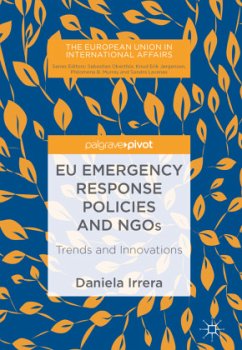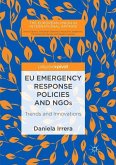This book analyses trends and changes in the European Union's (EU) humanitarian aid policy, by focusing on the performance of Non-governmental Organisations (NGOs). NGOs have developed strong relationships with international institutions but have also maintained direct interaction with EU member states. The result is a multi-layered process in which national interests, common values, universal principles and global duties meet and interact. By combining a deepening of the theoretical debate with the use of empirical data on the funding of NGO projects by EU institutions and member states, the book significantly furthers our understanding of the complex relationship between these actors. It will appeal to students and scholars interested in EU politics, global security, and international aid, as well as practitioners in the humanitarian field.
Bitte wählen Sie Ihr Anliegen aus.
Rechnungen
Retourenschein anfordern
Bestellstatus
Storno








